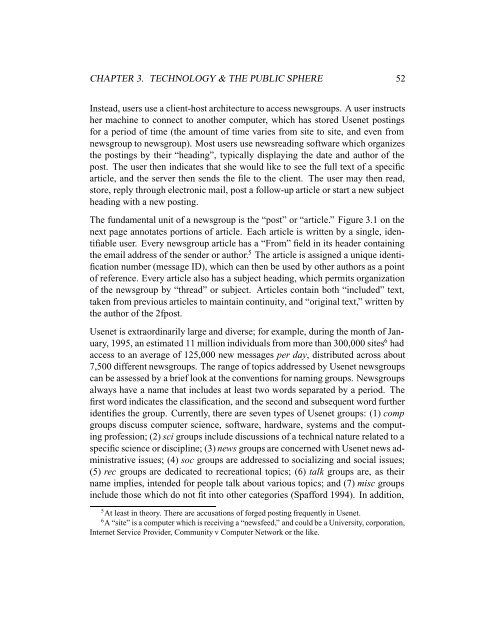Expanding the Public Sphere through Computer ... - ResearchGate
Expanding the Public Sphere through Computer ... - ResearchGate
Expanding the Public Sphere through Computer ... - ResearchGate
You also want an ePaper? Increase the reach of your titles
YUMPU automatically turns print PDFs into web optimized ePapers that Google loves.
CHAPTER 3. TECHNOLOGY & THE PUBLIC SPHERE 52<br />
Instead, users use a client-host architecture to access newsgroups. A user instructs<br />
her machine to connect to ano<strong>the</strong>r computer, which has stored Usenet postings<br />
for a period of time (<strong>the</strong> amount of time varies from site to site, and even from<br />
newsgroup to newsgroup). Most users use newsreading software which organizes<br />
<strong>the</strong> postings by <strong>the</strong>ir “heading”, typically displaying <strong>the</strong> date and author of <strong>the</strong><br />
post. The user <strong>the</strong>n indicates that she would like to see <strong>the</strong> full text of a specific<br />
article, and <strong>the</strong> server <strong>the</strong>n sends <strong>the</strong> file to <strong>the</strong> client. The user may <strong>the</strong>n read,<br />
store, reply <strong>through</strong> electronic mail, post a follow-up article or start a new subject<br />
heading with a new posting.<br />
The fundamental unit of a newsgroup is <strong>the</strong> “post” or “article.” Figure 3.1 on <strong>the</strong><br />
next page annotates portions of article. Each article is written by a single, identifiable<br />
user. Every newsgroup article has a “From” field in its header containing<br />
<strong>the</strong> email address of <strong>the</strong> sender or author. 5 The article is assigned a unique identification<br />
number (message ID), which can <strong>the</strong>n be used by o<strong>the</strong>r authors as a point<br />
of reference. Every article also has a subject heading, which permits organization<br />
of <strong>the</strong> newsgroup by “thread” or subject. Articles contain both “included” text,<br />
taken from previous articles to maintain continuity, and “original text,” written by<br />
<strong>the</strong> author of <strong>the</strong> 2fpost.<br />
Usenet is extraordinarily large and diverse; for example, during <strong>the</strong> month of January,<br />
1995, an estimated 11 million individuals from more than 300,000 sites 6 had<br />
access to an average of 125,000 new messages per day, distributed across about<br />
7,500 different newsgroups. The range of topics addressed by Usenet newsgroups<br />
can be assessed by a brief look at <strong>the</strong> conventions for naming groups. Newsgroups<br />
always have a name that includes at least two words separated by a period. The<br />
first word indicates <strong>the</strong> classification, and <strong>the</strong> second and subsequent word fur<strong>the</strong>r<br />
identifies <strong>the</strong> group. Currently, <strong>the</strong>re are seven types of Usenet groups: (1) comp<br />
groups discuss computer science, software, hardware, systems and <strong>the</strong> computing<br />
profession; (2) sci groups include discussions of a technical nature related to a<br />
specific science or discipline; (3) news groups are concerned with Usenet news administrative<br />
issues; (4) soc groups are addressed to socializing and social issues;<br />
(5) rec groups are dedicated to recreational topics; (6) talk groups are, as <strong>the</strong>ir<br />
name implies, intended for people talk about various topics; and (7) misc groups<br />
include those which do not fit into o<strong>the</strong>r categories (Spafford 1994). In addition,<br />
5 At least in <strong>the</strong>ory. There are accusations of forged posting frequently in Usenet.<br />
6 A “site” is a computer which is receiving a “newsfeed,” and could be a University, corporation,<br />
Internet Service Provider, Community v <strong>Computer</strong> Network or <strong>the</strong> like.
















